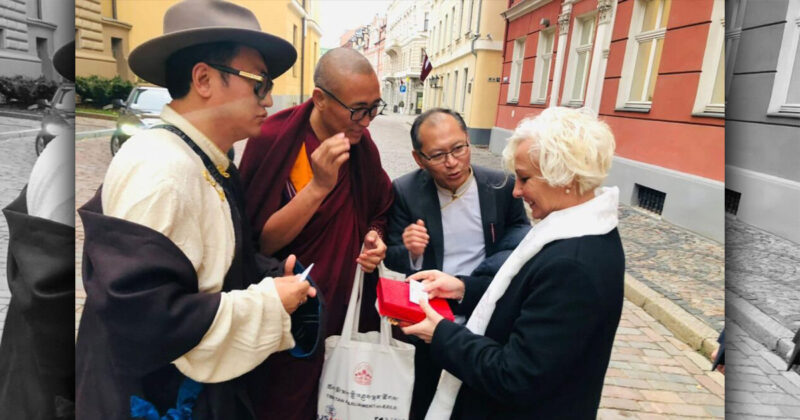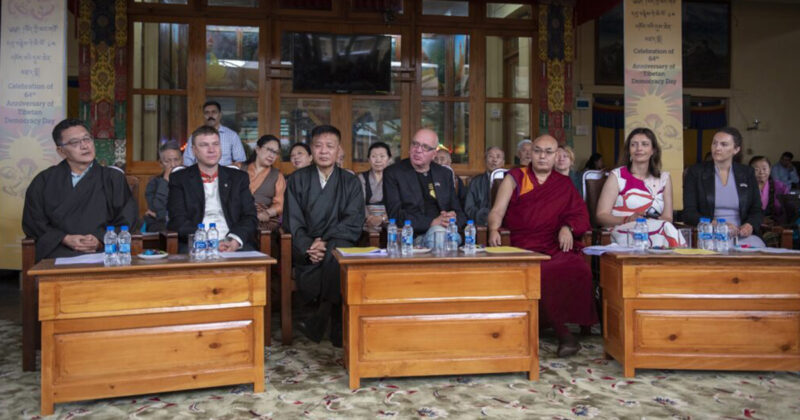Tibetan parliamentarians have been busy in Europe this month, where they’ve working to garner support for Tibet with visits to Latvia and Estonia, among other countries.
As it turns out, they aren’t alone. The Chinese government has sent a team of state-supported “Tibetologists” to spread Chinese propaganda in European countries in an effort to counter recent visits by leaders from the Central Tibetan Administration.
Beijing’s propaganda team
Chinese state media reported that a group of “Tibetologists” visited Latvia from 7 to 10 November and Estonia from 10 to 13 November 2024. Organized by the Chinese State Council Information Office (SCIO), the group spoke about the “development achievements of Tibet in China in the new era, and the development results of education, medical care, ecological environment protection and other developments shared by the people of all ethnic groups in Tibet.”
It is no coincidence that the visit by the delegation from China overlapped with the visit to Latvia and Estonia by a group of Tibetan parliamentarians from Dharamsala to these countries. Tibetan Parliamentarians Geshe Lharampa Gowo Lobsang Phende and Wangdue Dorjee were in Latvia during which they met the Speaker of the Latvian Parliament, Daiga Mieriņa, as well as MPs on 13 November 2024. Currently, several Tibetan parliamentarians are visiting different countries in Europe.
 The two Tibetan parliamentarians with the Speaker of the Latvian Parliament. Also seen is Tenzin Kunga from the Office of Tibet in London. Photo: www.tibet.net
The two Tibetan parliamentarians with the Speaker of the Latvian Parliament. Also seen is Tenzin Kunga from the Office of Tibet in London. Photo: www.tibet.net
The Chinese government is likely perturbed by the continuing support for Tibet among the Baltic countries. Political scientist Anne-Marie Brady, who specializes in Chinese domestic and foreign politics, contends that the State Council Information Office is just another name for the Chinese Office of Foreign Propaganda.
SCIO has remained consistently engaged in propagating the Chinese narrative on Tibet. It orchestrated a series of ‘Forums on the Development of Tibet,’ with the first event in the series held in the Austrian capital of Vienna in 2007. The second was held in the Italian capital Rome in 2009, and the third was held in the Greek capital of Athens in 2011. Since the fourth forum, which was held in the Tibetan capital Lhasa in 2014 (the fifth and sixth were also in Lhasa in 2016 and 2019, the seventh in Beijing in 2023), the Tibet Autonomous Region has also been named as a co-organizer.
Expert testimony
China would have been concerned that in January 2024, a hearing titled the “The Legal Status of Tibet” was held in the Estonian Parliament and attended by 35 Estonian MPs. During the hearing, Tibetan political leader Sikyong (Political leader in exile) Penpa Tsering testified in order to “give historical context to the Tibetan narrative, Middle-Way Approach and the importance of correcting historical facts of Tibet’s independence before its invasion by the People Republic of China.”
 Sikyong Penpa Tsering testifying at an Estonian Parliamentary hearing on the status of Tibet on January 25, 2024. Photo: www.tibet.net
Sikyong Penpa Tsering testifying at an Estonian Parliamentary hearing on the status of Tibet on January 25, 2024. Photo: www.tibet.net
Two other people who testified at the hearing were Professor Hon-Shiang Lau, a research scholar of Chinese history who retired from the City University of Hong Kong; and Dr Michael van Walt van Praag, expert in intrastate conflict resolution and international law.
Professor Lau explained that – contrary to Chinese Communist Party claims on Tibet – Chinese imperial records, whether from the Chinese Ming dynasty or the Manchu Qing dynasty, never recorded Tibet as part of China. Dr. Michael van Walt van Praag informed the parliamentarians why “China has been looking to buy the legitimacy of its occupation of Tibet by insisting on its trading partner governments to declare ‘Tibet as an internal issue of China’ as a justification for denying Tibetan people the right to self-determination,” and explained how this position breaches international law.
Dharamsala’s official report said the “Estonian media gave the event excellent coverage’ to the hearing and the Sikyong’s visit.
Sikyong had also visited Latvia and on 29 January 2024 strategized with the Latvian Parliamentary Support Group for Tibet,while Estonian parliamentary delegations have also visited the Tibetan exiled leadership in Dharamsala as a visible symbol of their support.
Juku-Kalle Raid, the Chair of Tibet Support Group in Estonian Parliament, led a delegation to Dharamsala to participate in the 64th anniversary of Tibetan Democracy Day on 2 September 2024, and also read a message for the day from the Speaker of the Estonian Parliament. Raid had also led an Estonian parliamentary delegation to Dharamsala on 25 April 2024, and Tibet Support Group participating in the 35th birthday celebrations of the 11th Panchen Lama (under detention by China) during which he said, “The people of Estonia have consistently shown a deep admiration and affection for Tibet, and this enduring sentiment will continue to prevail.”

Estonian parliamentary delegation with the Tibetan leadership in Dharamsala on 2 September 2024.
Photo: www.tibet.net
Battle over perception
China also sent similar “Tibetologists” groups to France and Norway at the end of September 2024. The visit to France by the Chinese officials was certainly connected to the meeting that Sikyong Penpa Tsering had with French President Emmanuel Macron on 1 May 2024. Sikyong had presented an autographed photo from the Dalai Lama to President Macron.
China’s Tibet policy has been a subject of international scrutiny ever since its invasion and subsequent occupation of Tibet in 1959. The Chinese government knows that there is a political problem in Tibet. But rather than working to peacefully resolve it, one of its approaches is to falsify the situation and employ various methods to control the narrative around Tibet, aiming to reshape its portrayal in global discourse.

Xi Jinping emphasized early in his tenure the importance of external propaganda in shaping China’s global image and narrative. On 19 August 2013, during his address to the National Propaganda and Ideology Work Conference, Xi advocated for “innovation” in China’s external propaganda efforts, promoting the idea of effectively “telling China’s story.”
ICT expects further escalation by China in the future in an attempt to dominate the global conversation with China’s propagandistic narrative and storytelling. A new propaganda center called the “Tibet International Communication Center” was launched in Lhasa on 2 September 2024, marking a significant step in China’s ongoing campaign to reshape international public opinion on Tibet. TAR Party Secretary Wang Junzheng instructed resource integration and optimization of the external propaganda system and mechanisms to “build a foreign discourse system and narrative system related to Tibet” in accordance with the CCP central leadership’s order.